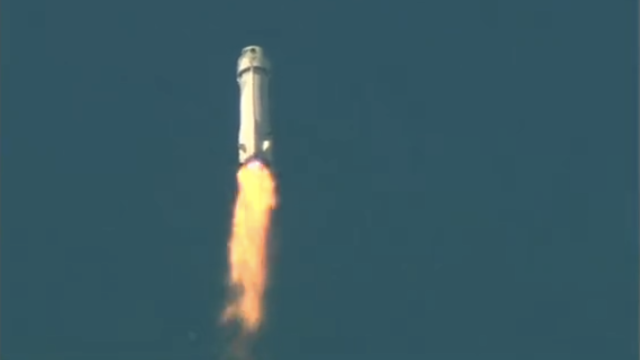House science committee leaders are asking the FAA to disclose more details as the agency investigates a recent incident involving the failed launch of an uncrewed Blue Origin New Shepard rocket.
The House Committee on Science, Space, and Technology appears to have taken a vested interest in the Federal Aviation Administration’s investigation of the recent New Shepard booster failure. In a September 15 letter written to the FAA, committee chair Donald Beyer, writing on behalf of the House panel, asked that the agency be more open in its probe and that it brief the subcommittee within the next 10 days.
The incident happened during Blue Origin’s uncrewed NS-23 mission, which blasted off from the company’s Launch Site One in west Texas on Monday, September 12. New Shepard’s booster appeared to fail 65 seconds into the flight, triggering the rocket’s abort system; the capsule shot away from the flame-engulfed booster and performed a safe parachute-assisted landing. The same could not be said for the booster, which crashed onto the surface. There were no reports of injuries or damage to property. Blue Origin, owned by Amazon-founder Jeff Bezos, has so far been tight-lipped about the cause of the major malfunction.
The launch vehicle was attempting to deliver 36 science and technology payloads to suborbital space, many of them sponsored by NASA. New Shepard normally brings passengers to suborbital space, but not this time. To date, Blue Origin has sent 31 people to space, with the most recent crewed flight happening on August 4. Given that the company uses New Shepard to transport humans, the FAA got involved, grounding the rocket and launching an investigation. The FAA said it “will determine whether any system, process, or procedure related to the mishap affected public safety” and that it’s “responsible for protecting the public during commercial space transportation launch and reentry operations.”
Writing in the House letter, Beyer said he was “relieved that no humans were onboard,” but on “a different day with a different mission, this vehicle’s anomaly could have put human lives in danger.”
Because the subcommittee’s jurisdiction includes commercial space launches and reentries, and also the FAA’s Office of Commercial Space Transportation, the chair asked that the FAA keep members of the subcommittee “apprised of the plans and timetable for the NS-23 anomaly investigation, the root cause of the failure once determined, and plans to ensure that actions to address the root cause or causes are completed.” The House panel also requested that a briefing be held within 10 days “on the plans and process for the investigation and provide future updates on the progress of the investigation.”
Congress is really up in the FAA’s business on the matter. It obviously wants to make sure that the agency performs its due diligence and that an important precedent is set when it comes to regulating the fledgling space tourism industry. The subcommittee, through its close monitoring of the investigation, is also likely seeking to make sure that Blue Origin does not get off easily and that the FAA issue an effective set of corrective actions to make New Origin safe such that it can get up and flying again. As to the current attractiveness of Bezos’s space tourism offering, that’s another question entirely.
